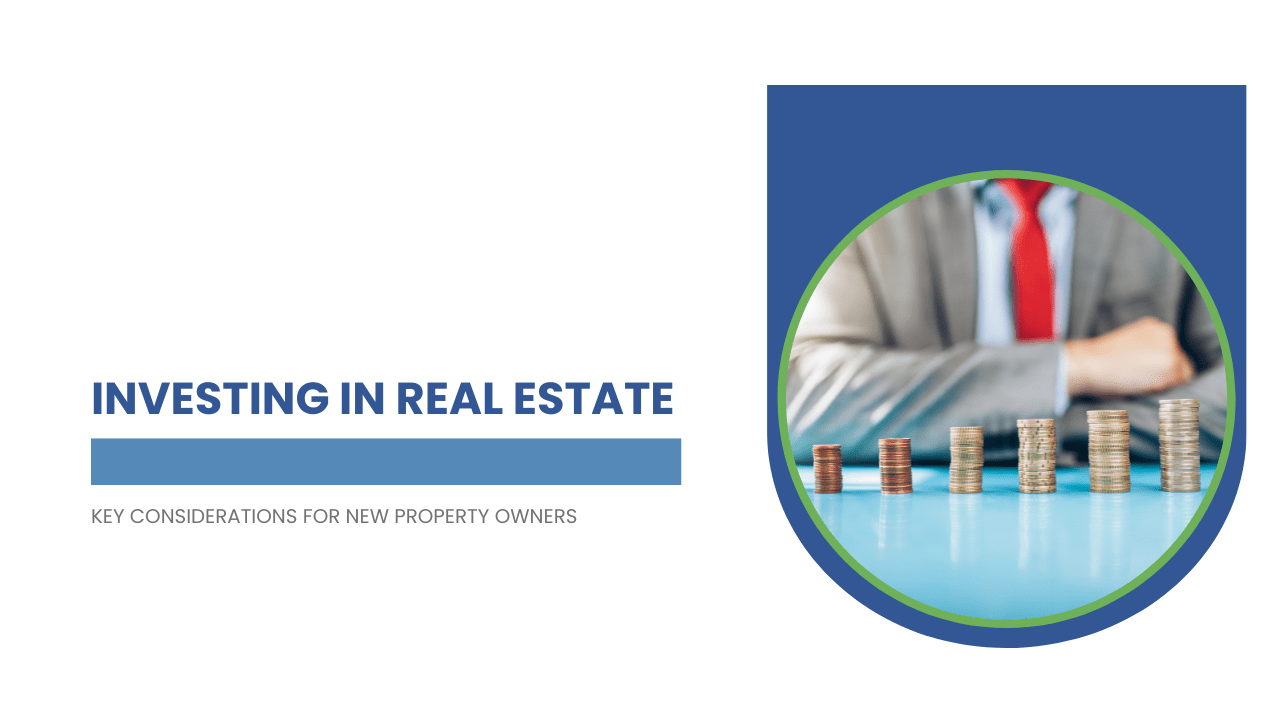
Investing in Fox Valley real estate is a smart move, and even if you’re new to investing and the rental property market, you’re already setting yourself up for success and profitability. Real estate generally makes money, especially when you’re able to keep your asset occupied with quality tenants and in good condition.
We love investing in rental real estate because your tenants can be counted on to contribute to expenses such as maintenance and management while you build equity and enjoy growing appreciation. You’re making money as soon as you acquire the asset.
Things can seem chaotic and difficult to navigate when you’re new to investing, so we wanted to put together some key considerations that new property owners should know about.
So, while any investor at any level of their real estate career can certainly benefit from what we have to say today, we’re starting with some strategic advice for those who are new to investing and want to enjoy a rewarding and profitable experience.
Many first-time investors come to real estate looking for passive income. You will enjoy passive and consistent income, as long as you take the necessary steps to set yourself up for success.
For starters, we recommend that you begin working with a local Fox Valley property manager as soon as possible. Don’t wait until you’re ready to lease the home. You want to leverage market knowledge and technology to choose a profitable investment that will hear high rents and attract great residents. When you’re already in possession of the property, you want to make sure you’ve made the necessary updates and upgrades in order to maximize what it earns and to attract the best possible residents. Property managers can be very helpful with these details.
Let’s take a look at what you should know as a new rental property owner, and how you can ensure you’re most likely to succeed as a real estate investor.
How to Approach Rental Property Ownership in Fox Valley

Each rental property owner comes to the Fox Valley market with their own unique set of investment goals and plans for the future. Maybe you own a property that you’re not living in because you inherited it from a family member. Maybe it’s a home you once lived in yourself, and you’re not prepared or willing to sell it just yet, so you plan to rent it out. Maybe you bought the property, identifying a great deal and deciding to jump into the world of landlords and tenants.
There are many kinds of investors, too. Some people invest to make an immediate profit. They fix up distressed homes and renovate them, then sell. Some investors buy vacation properties and use the homes for themselves part of the year and rent it out when they’re not occupying the properties themselves.
At Blue Frog Property Management, we are willing and happy to work with all kinds of investors and rental property owners.
For the purposes of our conversation today, we are focusing on those investors who want to rent out properties for the long term. This buy and hold strategy, we’ve found, is often the best way to enjoy stable and recurring earnings and to remain profitable for the long term.
Welcome to the Fox Valley Rental Market
How Well Do You Know the Market? Before making any investment or getting started with a rental property, it's very important to understand the market you're entering. Maybe you are local to Fox Valley and already have some idea of where the best neighborhoods are and what types of properties are available. If you’re investing from afar, make sure you do some investigation into where you want to invest and what you want to buy. Study local real estate trends. Check out local property values and where they’ve landed over the last few years. You’ll need to get an idea of the rental rates, too; are they going up or are they stagnant? How much demand is there for rental properties? Get to know the location and decide which areas and property types are best suited to your investment goals. There are likely to be seasonal variations, and you want to study those, too. Fox Valley rental properties can rent faster and for more money in the spring and summer, generally speaking. There are a number of things that go into pricing and marketing as well as preparing a property for rent. Understanding the market and its demands will help you with those tasks before the leasing of your home begins. This is also a good time to analyze your competition. See what similar properties are renting for, and how often they are occupied. By looking at other rental properties on the market, you can determine how much vacancy you can expect and whether turnover processes will take more time than you expect. | How Well Do You Know the Tenants in this Market? Tenant demands and preferences tend to shift over time, and you’ll be far more successful as a rental property owner when you can anticipate what prospective residents will be looking for and how you can attract them to your property. Get to know what the most important amenities, features, and design elements seem to be to the most qualified tenants looking for homes in Fox Valley. Are they prioritizing single-family homes with a lot of yard space? Are they looking for value, choosing smaller homes in multi-family buildings, instead? This is another area where a local property management partner can be extremely beneficial. We work with tenants as much as we work with property owners; we know what they’re looking for. We know what they expect when they’re looking for their next home, and we know where their priorities fall. We also follow their changing needs and desires. Ten years ago, in-unit washer and dryers were not nearly as popular as they are now. Today, it’s very difficult to rent out a property for a good price if there isn’t a laundry system set up and available. Your property manager can make recommendations and market your property according to current tenant demands. |
Do You Have Clear Financial Goals and Investment Strategies? To be prepared for the rental market and your ability to succeed in it, you have to have a clear idea of where you stand financially and what you’re hoping to accomplish. Maybe cash flow is your most important financial goal. You could be in possession of a home that’s already paid off, and all of the rent you earn will be total profit. You’ll want to maximize that income as much as you can, and you’ll be in a fine position to keep up with maintenance, emergency repairs, and improvements and upgrades. Perhaps you’re more interested in the long-term appreciation of your asset. Whatever your money plans and your financial interests, you’ll want to be clear about how your rental property is going to move you closer to those goals. | How Well Do You Know the Property You’re Renting Out? Your asset might be in an HOA, it might have the latest smart home technology upgrades, and it may be a property that has specific landscaping needs. Maybe you’re renting out units in an apartment building that has an elevator that will need maintenance, or perhaps there are common areas that need special attention. It’s essential that you understand the maintenance needs of your rental property before you allow tenants to move in and live there. Get a schedule of seasonal preventative maintenance in order. Pay attention to landscaping and curb appeal. Know how the age and current condition of your property has an impact on what you’re planning for systems and organizations. Choose a profitable rental property when you’re investing. Consider location. |
Earning Income: Considerations for Your Rental Property in Fox Valley
 Investing in Fox Valley real estate, particularly rental homes, can create a steady stream of passive income, which is a goal for many real estate investors. We talked a bit about setting your financial goals. Here are the ways in which you can expect to earn money on your rental property.
Investing in Fox Valley real estate, particularly rental homes, can create a steady stream of passive income, which is a goal for many real estate investors. We talked a bit about setting your financial goals. Here are the ways in which you can expect to earn money on your rental property.
Consistent and Increasing Rents
Keeping your rental value consistent with market demands and raising the rent at renewal time will ensure you have a steady and recurring stream of income every month. Here are your most pressing considerations when it comes to setting and raising the rent.
Setting the Rent…
Get to know the market. What are the average rents for properties similar to yours in your neighborhood? How does your property compare to those rental homes?
Decide how much vacancy you’re willing to risk. You want to price your property as high as you possibly can. But, if you price it too high, you run the risk of a longer vacancy time. You’ll wait longer to find tenants who are willing to pay your high price. By reducing your monthly rent by even $25 a month, you might find you’ll place a tenant faster, which earns you more in the long term because you won’t lose a whole month to vacancy.
Always include the rental amount in your marketing and listing. This will help prospective tenants focus on the rental homes that are in their budget. You won’t waste your time or theirs.
Renewing the Lease and Rent Increases…
Conduct another market analysis at renewal time to get an idea of what the market supports in terms of average rents.
Talk to your tenants about their plans. Offer a renewal rate that’s likely to motivate them to stay, but still bring in more income for you. Most tenants will expect that their rent will go up at renewal time. Just don’t make the amount such a jump that you chase them out of your property. Retaining tenants is better for your bottom line.
Increasing Rental and Property Values
You’ll also make more money on your rental property when you offer more.
This is where consistent updates and upgrades can be a benefit. While it will cost you money to make those renovations, the return on investment (ROI) is usually well-worth the cost and the investment of time and money. When you make strategic upgrades and improvements that get the attention of your tenants, you’ll earn more money now and in the future. The idea is to increase your rental value in the short-term and your overall property value in the long-term.
Don’t be afraid to think creatively. By offering amenities and added value services, you can earn even more. Consider valet trash services, allow pets, and provide in-unit washers and dryers. These things increase what you earn.
Tax Benefits
Tax benefits are also going to help you earn some extra income, and a lot of investors and rental property owners forget that this is a big deal when it comes to profitability and rental properties. While you do have to pay taxes on the income you earn, you can take advantage of a number of tax breaks as a rental property owner. And they’re fairly significant.
Let’s make sure you’re taking all of the deductions to which you’re entitled. Here’s a brief list of what you don’t want to miss.
Mortgage Interest Deduction One of the most significant tax benefits for real estate investors is the mortgage interest deduction. You can deduct the interest paid on your mortgage from your taxable income, reducing your overall tax liability. This deduction applies to loans used to acquire or improve rental properties. Make sure you have an accurate statement that shows how much interest was paid on your mortgage or any type of loan or money borrowed. | Depreciation Depreciation allows you to recover the cost of your investment property over time. The IRS permits you to depreciate residential rental properties over 27.5 years. This means you can deduct a portion of the property's cost each year, even if the property's value is appreciating. This is a pretty generous timeframe by IRS standards, so make sure you’re leveraging this important deduction. It can make a big difference in what you’re paying. |
Property Tax Deduction What about those property taxes you pay to your local government? Property taxes are a necessary expense for real estate investors, but they can also be a valuable deduction. You can deduct the property taxes you pay on your rental properties from your taxable income, further reducing your tax burden. A lot of property taxes have gone up for Fox Valley property owners, thanks to higher property values. Make sure you’re working off an accurate tax bill. | Operating Expense Deductions From maintenance and repairs to property management fees, many expenses associated with owning rental properties are deductible. Common deductible expenses include utilities that might be paid on your property as well as insurance premiums, advertising costs to find a new tenant, and legal and professional fees. Fox Valley property management fees are also tax deductible. |
Capital Gains Tax Benefits

When you sell a property, you may be subject to capital gains tax on the profit. However, there are strategies to minimize this tax. The most important and well-known way to defer your capital gains tax is by utilizing a 1031 Exchange. By reinvesting the proceeds from the sale into a similar property, you can defer paying capital gains tax. There’s also the long-term capital gains tax rate to consider if you’re an investor who has been in the game for a while. Holding a property for more than a year qualifies you for long-term capital gains tax rates, which are typically lower than short-term rates.
Long-Term Appreciation and Equity
Fox Valley rental properties often appreciate in value over time, offering substantial returns when you sell. You can also leverage equity. By using the equity in your property, you can invest in additional properties and expand your portfolio.
These are just some of the financial benefits we want you to be prepared for as you launch yourself into owning rental property.
Fox Valley Property Management
 What about what happens once you’re ready to lease your home?
What about what happens once you’re ready to lease your home?
You’ll need to think about marketing the property. Screening tenants. Coming up with a lease agreement. You’ll need a team of vendors and repair experts. You’ll need a system for accounting and financial reporting.
Trying to do it all alone, especially when you’re new to the rental market, is not a great idea.
Effective and professional property management will help with maintaining rental income and protecting your investment. Smart investors understand the value of professional property management. It provides for careful and compliant tenant screening, preventative maintenance and preferred vendors, and compliance with state, federal, and local laws.
Your property management partner will handle the leasing, management, and maintenance of your investments, and the sooner you have this relationship in place, the more successful and profitable you are likely to be.
Let’s talk about how to make your first rental property a successful one. Contact us at Blue Frog Property Management.




For after-hours emergency maintenance issues, call
1-888-832-0258